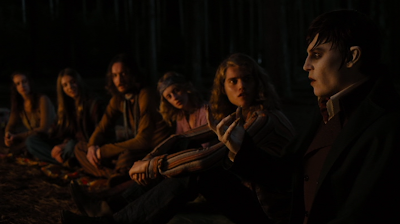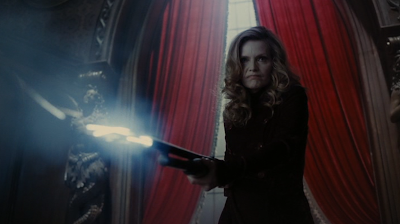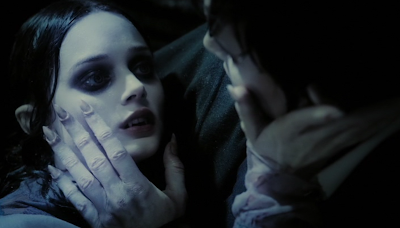We're back to wish you a Merry Christmas, and depending on your point of view — leave this 'gift' under the tree, or 'piece of coal' in your stocking!
John: I first experienced Tim Burton's Dark Shadows when it played theatrically in 2012, and while I had seen quite a few episodes from the show before then, and was very familiar with the main cast of characters from the Barnabas era, I had not yet experienced the series in its entirety until we started the blog. That said, I was disappointed with how things were handled in the film. But coming off of our having watched the complete series and two feature films, I agreed it was worth giving Tim Burton a second chance to see if I might have judged him unfairly.
Christine: Up until now, I have not had any interest in seeing this movie, and I approach it with a great deal of trepidation. I have been reading the Dark Shadows novels by Marilyn (Dan) Ross, which has our familiar cast of characters existing within a separate continuity from the TV series, and I will try to view this movie with the same open mindedness I do the novels.
John: At least with the novels, you can picture the actors you know and love from the show, and accept it as yet another parallel-time scenario. And speaking of the Marilyn Ross novels, for anyone interested in reading more about those (as well as the synopsis of a final, unpublished novel), there's a great article on them in bare•bones — the best of, which I co-edited, and is available through Amazon.
"It is said that blood is thicker than water. It is what defines us. Binds us. Curses us. For some, blood means a life of wealth and privilege. For others, a life of servitude."
Right off the bat, this Dark Shadows universe establishes that Barnabas came to Maine with his family in 1760 to build their fishing industry and found the town of Collinsport, and that he and Angelique knew each other as children. We jump ahead to a rapid succession of events, beginning with Barnabas rejecting Angelique's advances, causing her to use witchcraft to kill his parents, and then, after hearing Barnabas declare his love for Josette, she puts a spell on Josette to make her take a fall from Widow's Hill. After seeing his one true love dead on the rocks, he leaps after her and assumes a lifeless place beside her as the waves crash over them.
Christine: While I may have gotten whiplash from that intro, so far, I think the movie is off to an interesting start. I couldn't help thinking of dead Bill Malloy when seeing Barnabas' corpse on the rocks.
John: Yeah... I was a bit put-off right away by the fact that Josette was included as almost a throwaway reference. Without the baggage of the show, one might wonder why a) Barnabas would try to kill himself over her, or b) why he was so put-off by Angelique. I mean, the animus prior to her cursing him almost makes less sense when you consider that they were childhood friends. And for what it's worth, would it have killed them to throw a few bones to fans by including (even if only in cameo appearances) other familiar names from the show, such as Bill Malloy?
But wait! He rises from the rocks with a pasty look and bloody tears streaming down his face to look up at Angelique staring down at him from the cliff, as his fingers elongate and his fingernails grow. He helpfully explains that Angelique cursed him to be a vampire, though how she accomplished that remains a mystery.
John: What a missed opportunity to introduce a Tim Burton-designed bat to administer her curse. No offense to Bil Baird, but that could have been one definite improvement over what we got in the show.
Christine: I do not believe Tim Burton could have improved on that treasured moment when the Bil Baird bat bites Barnabas, which is probably why he left it out. I love that little guy flying on his fishing pole! Still, a bat really seems required here.
Angelique gets a mob of torch wielding townspeople to lock Barnabas in a coffin and lower him into the ground.
Christine: Mind you, we are not even 8 minutes into the movie yet, so it's kind of difficult to understand Angelique's motivation for locking him up, but maybe we'll get around to it.
John: Let's just say there was a mob, and they captured and chained up a vampire and buried him. Are you telling me that no one in town would have passed that particular cautionary tale down through the generations? No way the Collins clan washes away that stain. Thankfully they forego laying out a Collins family tree to try and explain how the characters are related to old Barnabas.
Christine: Unfortunately, it leads one to wonder why the mob wouldn't just destroy him. It made sense in the series to have him chained up because his father couldn't bear to kill him and was unable to consider the torture he imposed on his son by locking him up indefinitely. While Angelique was able to appreciate that fate, why would the townspeople go along with it?
Fast forward to 1972 where Maggie Evans, who is Josette's doppelgänger, makes her way by train to Collinsport as "Nights in White Satin" plays. She begins to rehearse her introduction to the family, and decides to change her name to Victoria Winters after seeing a travel poster on the wall.
Christine: This must be a means to explain why the character of Maggie Evans is technically absent from this movie, but it is another harbinger of what to expect from this film to have a foundational character of the TV series turn out to be a fabrication. At least there is good music.
John: Where's Burke Devlin when we need him? The film does have a decent period soundtrack, but by this point I was reconsidering how much of a fan of the show Tim Burton really was. Would someone steeped in the lore of Collinwood sign on to this particular take of the characters/storylines?
Vicki hitches a ride with some hippies to Collinwood and gets a good look at the 1970s era fishing village.
Christine: I'm getting the impression that 1970s nostalgia is going to be a big factor in this film. I'm okay with that, as long as it serves the story.
Christine: At least Dr. Hoffman has a more plausible explanation for taking up residence at Collinwood than she did in the TV series.
John: I was curious at this point whether David's Mom would play an active part in the film, or if the reference to her was a throwaway line. Willie is played by the always entertaining Jackie Earle Haley, and Julia is played by Burton's then muse de jour Helena Bonham Carter. Followers of his filmography may be aware that he swapped prior muse Lisa Marie for Bonham Carter during the (re)making of Planet of the Apes, in which both women appeared. I pass no judgement in pointing out he chose the ape from that film. For what it's worth, Burton and Bonham Carter have since split, and though I've not heard anyone linking him romantically to Bonham Carter's co-star, Dark Shadows Eva (Angelique) Green, who appears to be his latest muse, having filled the post-Dark Shadows Bonham Carter void in Miss Peregrine's Home for Peculiar Children and Dumbo. But enough with the tabloid headlines, and back to the feature.
John: I wonder what Josette's motivation was for appearing, particularly prior to Barnabas' arrival at Collinwood. Again, to those familiar with the show, you can make assumptions, but for the uninitiated, does this make any sense?
Christine: Vicki does not seem too surprised to encounter a ghost who looks like her, though later scenes explain why she was unsurprised to see her, as well as why she was there before Barnabas. It was good to see there may be some scary elements in this movie.
John: Yeah, but sadly limited to PG-13 scary.
John: I think I had a clear sense that we weren't in Kansas anymore when Barnabas saw the McDonald's golden arches, and assumed it was a reference to Mephistopheles. So much for any real attempt to be scary, with tongue so firmly in-cheek.
Christine: I agree. It certainly reduced the impact of the prior scene.
Christine: I think that could end up being a nice diversion from the original story, depending on how it ends up being treated.
John: I agree this was an interesting twist to apply to the storyline, but it was all-too clear to me that things were just going to be played for camp for me to get excited about this going in a fresh direction. I normally love Tim Burton's sensibilities and visual style, but I am left to believe that any love for Dark Shadows he may have harbored was based on a love for what he thought Dark Shadows was, as opposed to the show that it actually was. As if he grew up playing the Dark Shadows game, and building the Barnabas and Werewolf model kits, and perhaps collected the books and comics without reading them — but never really saw much of the show and only knew about it from articles he may have read in Famous Monsters or Teen Beat magazines. And this is not to say that he should have focused more on appeasing the existing Dark Shadows fan base — a successful film, or launch of a new franchise, would require a much more sizable audience than that. Of course the down-side of playing to a broader audience is that you don't find them, and you disappoint the existing base in the process. Oh, and you can't do a period piece like this without also using Donovan's "Season of the Witch."
Christine: Scenes like this one that are played straight have been the most effective and enjoyable thus far.
John: Yep. The film does seem to have an identity crisis, and had me longing for a Tim Burton House of Dark Shadows-take on the material.
Christine: It's nice to see that Barnabas' family values are still represented, but it will be a surprise if he doesn't end up bringing total ruin to the family.
Christine: It remains to be seen whether or not she'll try to get Barnabas back in accordance with past history.
John: While I understand why Burton would cast Depp as Barnabas, I wish he didn't play the character so broadly. On the other hand, I think Eva Green's Angelique steals every scene she's in.
John: It was nice to see Christopher Lee turn-up in a cameo role; one of his last outside of a few more Saruman appearances for Peter Jackson.
Christine: Could this be the beginning of an infatuation for Julia?
John: Once again, an interesting way to introduce a concept from the original show... if it goes anywhere.
John: This scene had my wife cracking up in the theater. Sure, it's funny, but sadly, it's indicative of the sillier film Burton chose to make.
Christine: Interesting to see see that her involvement with Josette goes back to childhood, and that she may have been responsible for bringing Vicki to Collinwood. Now we can understand why Vicki was not surprised to see her initially, and that she appeared before Barnabas' arrival because she attached herself to Vicki early on.
Christine: This scene left me with a profound sense of disappointment. Tim Burton could have easily done better. Even Alice Cooper got better air time.
John: Yep, our last look at Jonathan Frid can almost be captured in its entirety in that screenshot. And while it might have been funny once, Barnabas' repeated statements about Alice being a woman quickly wore thin...
Christine: I find the choice to have Vicki arrive at Collinwood by Josette's hand an interesting idea, though it's still not clear what she expects her to accomplish.
John: This is an example of a story thread that might have proven more interesting in the long-form of a television show where they had time to develop the idea. Here it just came across to me as contrived.
Christine: An interesting twist on Julia's betrayal.
John: Yep, this would have been a very interesting plot point in a more serious take on the subject matter. Here, it just serves as a setup for a later gag.
John: Can you imagine had Roger decided to stay and become a good father? That might have been the funniest joke in the film!
Christine: This incarnation of Angelique doesn't really mess around.
John: I think the breaking of Barnabas' wolf's head was symbolic of how the filmmakers treated of the legacy of Dark Shadows.
John: Carolyn-as-werewolf might have made for a cool storyline, as opposed to a last-minute revelation that doesn't amount to anything more than the ticking one more box on the Dark Shadows bingo card.
Barnabas reaches Vicki at the cliff, who says he has lost her because he lives in the shadows while she lives in the light. He refuses to give her immortality, so she takes the cliff dive, causing him to fall after her and bite her in midair so she can rise from the rocks as one of the undead. Barnabas says his curse has finally been broken.John: This is arguably the coolest visual effect in the film.
 |
| I had the same look on my face when viewing the macrame scene. |






























































5 comments:
My problem with countless period movies is that (no matter who the makers are) they lay the period stuff on so heavily, without letting up on it, including the music. That's the main thing that's kept me from seeing this one, instead of anything I've actually heard against it.
It's hard to tell from this review whether I'd have that particular problem with it or not. All I know is that, when a period story has a song literally every few minutes, or some topical of show business reference that often, I just can't help tuning it out. It's almost never about the songs themselves or the other things, it's about the NUMBER of them.
Does this one really go overboard with that (depending on how you define going overboard with it)?
You may have a problem with it, Grant, though not because it goes overboard, but that there's no real purpose to the references other than serving up a plate of 1970s nostalgia. For instance, in the scene pictured above, Barnabas is demonstrating his knowledge of secret rooms at Collinwood to Elizabeth, only to discover that she's hidden away her macrame artifacts in one of the secret rooms. It's an excuse to poke fun at the 70s, but serves no other purpose in the story. In the scene with Victoria (Maggie) at the beach, Barnabas reads to her from LOVE STORY by Erich Segal, which he references again when consulting the pot smoking hippies for contemporary advice on courting women. The 70s music and references aren't continually in your face, but they're noticeable because they feel tacked on for no other purpose than reminding you of the era when you were a kid and excited to run home from school to watch DARK SHADOWS, maybe while your mom was busy doing macrame or reading LOVE STORY.
Coincidentally just saw a notification that the film (which is streaming on Hulu as I write this) will get pulled on 12/31. They linked to an interesting Collider article (https://collider.com/johnny-depp-tim-burton-dark-shadows-interview/) in which Burton discusses the challenges in bringing the adaptation to the big screen:
BURTON: It’s a tricky tone and we all recognize that. When we talked about Dark Shadows, part of its appeal was the weird nature of all the elements that went into it. It was very serious, but it was on in the afternoon, on a daily basis. There were certain reasons why we loved the show, but you couldn’t necessarily adopt to a film. It was the weirdest challenge to get the acting tone and the soap opera nature of the tone. That’s a weird thing to go for in a Hollywood movie. It’s not like you can go to a studio and go, “We want to do weird soap opera acting.” They go, “Oh, great! Whatever that means.” That’s why I was so grateful to all of the cast. Even the ones that didn’t know the show, got into the spirit of it. What made it Dark Shadows was trying to capture the spirit of what the show was.
Thank you for this. I am sorry I missed it when it was posted. (Thanks, blogger!) I didn't expect this feature was even going to get a mention, but now that it has, I am grateful. It confirms my expectations of what people understand about this film. Best...
I like your analysis better than rewatching the film again. I say this as a fan of Depp, too!
Post a Comment